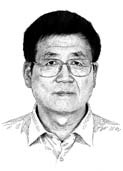Film
Talent rises from every generation
By Yu Wentao (China Daily)
Updated: 2011-06-01 08:21
 |
Large Medium Small |

As a China Daily reporter, I was lucky to have covered film events from the early 1980s to the late 1990s, an important period for the rising Chinese film industry.
In 1979, Huang Jianzhong co-directed a film entitled Little Flower, which brought a fresh fragrance to China's screen and created three new stars: Chen Chong, Tang Guoqiang and Liu Xiaoqing, still active today in film and TV circles.
I interviewed Chen Chong (Joan Chen) when she was shooting Beijing Encounter, the first Sino-US co-production of a feature film. She was so excited to co-star in this romantic flick and speak English throughout the performance. This was very rare then.
I also interviewed Tang Guoqiang at the Beijing Film Academy, one of China's three "cradles" for performing artists.
Since 1950, the academy has trained a galaxy of talent of whom the "Fifth Generation" graduates are considered a feather in its cap.
By the Fifth Generation, we mean the young directors who graduated in the 1980s. This powerful group includes Chen Kaige and Zhang Yimou among others. I have been deeply moved by their art pursuits and devotion to Chinese film production.
In 1984, Chen Kaige directed his first independent feature, Yellow Earth, which is considered a breakthrough in Chinese filmmaking, and helped establish his reputation overnight. In 1992, Chen's Farewell, My Concubine won the Golden Palm Award at the 46th Cannes Film Festival.
And there are many excellent film directors who belong to no generation.
For many years, China's film administrative organ promoted mainstream efforts while also allowing for various artistic styles.
The mainstream films reflect the current economic reforms and glorify Chinese people's revolutionary history.
As an English language newspaper with foreigners as its major readership, China Daily always has an unprejudiced attitude in evaluating both domestic and imported films, whether they are mainstream, avant-garde or controversial.
Entering the new century, China's film industry is quickening its pace in commercial operation with more emphasis placed on the film's entertainment function. The box-office value almost is the only standard to judge a good film and a successful director.
Last year, actor-turned-director Jiang Wen created a sensation nationwide with his film Let the Bullets Fly, when its box-office reached 660 million yuan, surpassing Feng Xiaogang's Aftershock, a mainstream film.
Jiang Wen is acknowledged as one of China's best actors and directors. In December 1995 when I visited the Xi'an shooting location of Zhou Xiaowen's historical film Ode to Brilliant Qin, I had a long talk with Jiang Wen, who played Ying Zheng, the first emperor of the Qin Dynasty (221-206 BC).
Asked about his cooperation with leading actor Ge You, Jiang said: "Ge You is a first-class actor with a marvelous sense of humor." Both Jiang and Ge enjoy good reputations among film fans.
"If Jiang is like a rock 'n' roll song, Ge is like a humoresque," a film critic has said. Jiang and Ge are by no means China's only film superstars and more and more new faces are coming to the screen.
My younger colleagues will keep a close eye on these latecomers who are striding proudly toward the brilliant future of Chinese cinema.
Yu Wentao is a senior editor with China Daily.
(China Daily 06/01/2011 page37)
| 分享按钮 |